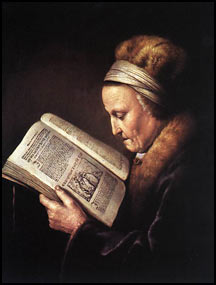 |
Katherine Philips

Gerrit Dou. Old Woman Reading a Bible. 1630.
In Memory of that excellent
Person Mrs. Mary Lloyd
of Bodidrist In Denbigh-
shire, who died Nov. 13,
1656, after she came thither
from Pembroke-shire.
I CANNOT hold, for though to write were rude,
Yet to be silent were ingratitude,
And folly too; for if posterity
Should never hear of such an one as thee,
And only know this age's brutish fame,
They would think Virtue nothing but a name.
And though far abler pens must her define,
Yet her adoption hath engagèd mine:
And I must own where merit shines so clear,
'Tis hard to write, but harder to forbear.
Sprung from an ancient and an honour'd stem,
Who lent her lustre, and she paid it them;
Who still in great and noble things appear'd,
Whom all their country lov'd, and yet they fear'd.
Match'd to another good and great as they,
Who did their country both oblige and sway.
Behold herself, who had without dispute,
More than both families could contribute.
What early beauty Grief and Age had broke,
Her lovely reliques and her offspring spoke.
She was by Nature and her parents' care,
A woman long before most others are.
But yet that antedated season she
Improv'd to Virtue, not to Liberty.
For she was still in either state of life
Meek as a virgin, prudent as a wife.
And she well knew, although so young and fair,
Justly to mix Obedience, Love, and Care;
Whil'st to her children she did still appear
So wisely kind, so tenderly severe,
That they from her rule and example brought
A native Honour, which she stampt and taught.
Nor can a single pen enough commend
So kind a sister and so clear a friend.
A wisdom from above did her secure,
Which as 'twas peaceable, was ever pure.
And if well-order'd Commonwealths must be
Patterns for every private family,
Her house, rul'd by her hand and by her eye,
Might be a pattern for a Monarchy.
Solomon's wisest woman less could do;
She built her house, but this preserv'd hers too.
She was so pious that when she did die,
She scarce chang'd place, I'm sure not company.
Her Zeal was primitive and practice too;
She did believe, and pray, and read, and do.
A firm and equal soul she had engrost,
Just ev'n to those that disoblig'd her most.
She grew to love those wrongs she did receive
For giving her the power to forgive.
Her alms I may admire, but not relate,
But her own works shall praise her in the gate.
Her life was checquer'd with afflictive years,
And even her comfort season'd in her tears.
Scarce for a husband's loss her eyes were dried,
And that loss by her children half supplied,
When Heav'n was pleas'd not these dear props t' afford,
But tore most off by sickness or by sword.
She, who in them could still their father boast,
Was a fresh widow every son she lost.
Litigious hands did her of right deprive,
That after all 'twas penance to survive.
She still these griefs hath nobly undergone,
Which few support at all, but better none.
Such a submissive greatness who can find?
A tender heart with so resolv'd a mind!
But she, though sensible, was still the same,
Of a resignèd soul, untainted fame,
Nor were her virtues coarsely set, for she
Out-did example in civility.
To bestow blessings, to oblige, relieve,
Was all for which she could endure to live.
She had a joy higher in doing good,
Than they to whom the benefit accru'd.
Though none of Honour had a quicker sense,
Never had woman more of complacence;
Yet lost it not in empty forms, but still
Her Nature noble was, her soul gentile.
And as in youth she did attract (for she
The verdure had without the vanity),
So she in age was mild and grave to all,
Was not morose, but was majestical.
Thus from all other women she had skill
To draw their good, but nothing of their ill.
And since she knew the mad tumultuous World
Saw crowns revers'd, temples to ruin hurl'd;
She in retirement chose to shine and burn,
As a bright lamp shut in some Roman urn.
At last, when spent with sickness, grief and age,
Her Guardian Angel did her death presage
(So that by strong impulse she cheerfully
Dispensèd blessings, and went home to die;
That so she might, when to that place remov'd,
Marry his ashes whom she ever lov'd):
She died, gain'd a reward, and paid a debt.
The Sun himself did never brighter set.
Happy were they that knew her and her end,
More happy they that did from her descend:
A double blessing they may hope to have,
One she convey'd to them, and one she gave.
All that are hers are therefore sure to be
Blest by inheritance and legacy.
A Royal Birth had less advantage been.
'Tis more to die a Saint than live a Queen.
|
10
20
30
40
50
60
70
80
90
100
|
|
[AJ Notes:
* This is an elegy on her stepdaughter,
Francis Philips, whom she loved deeply.]
|
Source:
Philips, Katherine. Poems, 1678.
in Minor Poets of the Caroline Period.
George Saintsbury, ed.
Oxford: Clarendon Press, 1905. 531-3.
 | to the Works of Katherine Philips
|
Site copyright ©1996-2006 Anniina Jokinen. All Rights Reserved.
Created by Anniina Jokinen on November 13, 2006.
|
|


